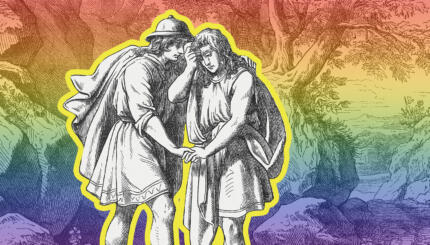The synagogue bill arrives, and I see the mistake appears again this year.
When we joined the synagogue, although we declined on our application to join the Sisterhood and Brotherhood, we were automatically billed for membership in these groups. I subtracted the cost from the total and paid the balance.
A few weeks later, we received an “outstanding bill” for the Sisterhood and Brotherhood memberships. My spouse called the office to confirm we were not interested in joining these groups and to ask that the synagogue remove the charges from our account. We didn’t want to make a big deal about it: These sub-communities within the synagogue community raise funds to subsidize the religious school and holiday celebrations, as well as organize social events for members. It’s not that I object to their good work; it’s just that, on principle, I personally don’t wish to be a member.
I grew up in the 1970s and 1980s in a Conservative synagogue in New Jersey, where girls celebrated bat mitzvah on Saturday mornings, reading from the Torah and leading services as the boys did. It was forward-thinking for its time and called itself egalitarian. Yet the social groups of the Sisterhood, the Men’s Club, and the Mr. and Mrs. Club played distinct roles within prescribed boundaries in the synagogue community. The Sisterhood ladies, my mother among them, set out the Oneg Shabbat (post-services refreshments) during the latter part of Friday night services. The Men’s Club sponsored and welcomed the bar mitzvah boys into the tallis and tefillin club on Sunday mornings.
The synagogue we joined last year is not nearly as bound by gender stereotypes, and it is ritually egalitarian according to 21st-century definitions within the Conservative movement. Our synagogue supports SOJOURN, marching in the Atlanta Pride parade with the Jewish community, and offers meeting space to a local PFLAG group. Our rabbis are outspoken advocates for equal rights for all people and are sensitive and aware of people in the room who may be — for any number of reasons — struggling to find their place in the Jewish community.
Nevertheless, I think it’s time to shift our boundaries, expand our synagogues’ social structures to be more welcoming to people of every gender identity, sexual orientation, and marital or parental status. The default on membership bills should not be an assumption of heteronormativity, or that every spouse in a family wants to join gender-specific clubs. My pronouns are she/her/hers, but that doesn’t mean I want to be in the Sisterhood.
We read in Proverbs 22:28, “Do not move back the long-standing boundary-marker that your ancestors have established,” which is generally understood to mean that we ought not to depart from the customs of our ancestors. As long as the Sisterhood and Brotherhood create opportunities for some to get involved in the community, I support maintaining this social construct of our ancestors who established our synagogues in previous centuries. However, I’m also committed to creating synagogues for 21st-century Jews.
Several biblical commentaries quote Proverbs 22:28 as a prooftext regarding how we treat the poor. Midrash Tanchuma suggests the word “long-standing” (‘olam) be read “the poor” (olim); this admonition refers to one who moves the boundary-markers of the poor by not allowing them to glean from his field, or by permitting one person but not another access to the field. Are there members of our communities who feel impoverished, or less invited to partake of our synagogues’ bounty, because certain groups are considered the default?
There are.
Therefore we must strive to establish better boundary-markers and to welcome every person into our sacred spaces.



